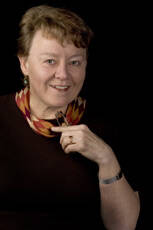I came home from a recent trip to London with a renewed sense of the cost of democracy and the contours of an old transatlantic friendship.
At the Globe Theatre I saw a new play by Trevor Griffith, a British playwright known for political theater and screenplays. “A New World: A Life of Thomas Paine” highlights the British citizen-turned-American revolutionary whose Common Sense mustered vital support for the war among the colonists. He also opposed slavery and urged Thomas Jefferson to write freedom for slaves into the Declaration of Independence.
My visit coincided with the eighth anniversary of 9/11. A day earlier, while crossing Grosvenor Square, my companion and I came upon a memorial for the British victims—a patio and a wall on which the names are inscribed. My friend found a name she recognized, the British husband of a colleague. Taken aback, we spent a moment in prayer for all the dead and felt close to Britons.
That week I observed on the television news how the British embrace the most recent of their fallen soldiers. They broadcast photos of them, display the return of their caskets and film their funerals live from St. Paul’s. The fallen soldiers are esteemed as national treasures. The country’s children brought home is an occasion of public, not merely private, mourning. Britain has lost more than 200 soldiers in Afghanistan, and many Britons are rethinking their nation’s ongoing participation in the war. Local journalists expect the Conservative Party to win the next election, not least because the Labour Party has seemed overly supportive of the United States in its wars in Iraq and Afghanistan.
Things were different between the two allies 70 years ago. I spent a day underground at the Churchill Museum and Cabinet War Rooms, where the prime minister, his wife and a skeleton crew (including clerks, trusted aides, the war cabinet and the central core of the military command) lived and worked during the London blitz and at times thereafter. This secret headquarters has been restored for public viewing. Faced during World War I with the aerial bombing of cities, the British built this bunker to protect the government in case of another such attack.
The rooms are small and basic. One can see the “Churchill suite” where Winston and Clementine slept and dined; the map room that served as the government’s hub; the cabinet room where the prime minister met, often late at night, with his cabinet and chiefs of staff; and the transatlantic telephone room, an old broom closet wired to become the original “hotline” between Churchill and F.D.R., who were friends. At the museum, you can hear Churchill deliver speeches and listen to the recorded memories of ordinary citizens who worked there as young people.
During my visit, an album by Vera Lynn, now 92 and now honored with the title “Dame,” overtook the Beatles at the top of the British music charts. She was the BBC’s songbird of comfort during World War II. Yet not everyone was supportive of that war either—not in the United States and not in Britain. As Vera Lynn sang “White Cliffs of Dover,” some Britons rioted in the street over the conduct of the war. And in London during the blitz, controversy dogged Churchill’s efforts to protect St. Paul’s. He thought the church was a national symbol of hope that could inspire the people not to give up. So as German bombs destroyed the residences surrounding St. Paul’s, Churchill directed firefighters to save the church. Asked why her album topped the charts this time, Dame Lynn linked it to current events: “Our boys are away again and the music is significant again.”








